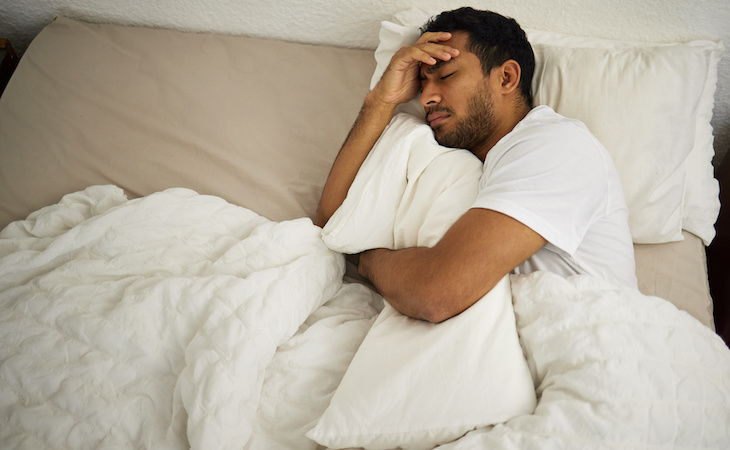Cognitive Behavioral Therapy for Insomnia (CBT-I) - Proven Methods
Cognitive Behavioral Therapy for Insomnia (CBT-I) - Proven Methods
Blog Article
Effective Therapy Solutions for Handling Rest Disorders and Enhancing Restful Rest
In the world of health care, the monitoring of sleep disorders and the quest for peaceful sleep are crucial components of general wellness. Reliable treatment services use a diverse approach to deal with these obstacles, varying from cognitive behavioral interventions to alternative methods that promote relaxation and mindfulness. The exploration of various techniques, consisting of the integration of medication and light therapy, opens a realm of opportunities in the pursuit of far better rest high quality. As we browse the detailed landscape of sleep problems and look for to boost our rest experience, a much deeper understanding of these treatment solutions may hold the trick to unlocking a much more relaxing and meeting restorative journey.
Cognitive Behavior Treatment for Sleeplessness (CBT-I)
Cognitive Behavior Therapy for Sleeping Disorders (CBT-I) is an organized, evidence-based therapy approach that concentrates on resolving the underlying elements adding to rest disruptions. This kind of therapy intends to change habits and thoughts that worsen sleep problems, ultimately promoting healthy rest patterns. CBT-I normally involves several crucial parts, including cognitive therapy, rest constraint, stimulation control, and rest health education and learning.
Cognitive therapy assists people identify and transform negative thought patterns and ideas regarding sleep that may be preventing their capability to fall or stay asleep. Sleep limitation involves limiting the amount of time invested in bed to match the individual's actual sleep period, therefore raising rest effectiveness (insomnia counseling). Stimulation control strategies assist establish a solid association between the bed and rest by encouraging people to visit bed only when drowsy and to prevent participating in stimulating tasks in bed
Additionally, sleep health education and learning focuses on developing healthy and balanced rest habits, such as maintaining a regular rest routine, producing a relaxing bedtime routine, and enhancing the rest setting. By dealing with these elements thoroughly, CBT-I supplies an efficient non-pharmacological intervention for taking care of insomnia and boosting overall rest high quality.
Rest Hygiene Practices
Having actually established the foundation of cognitive restructuring and behavior adjustments in dealing with insomnia with Cognitive Behavior modification for Sleeping Disorders (CBT-I), the emphasis currently moves towards checking out important Rest Hygiene Practices for keeping optimal rest quality and general health.
Sleep hygiene practices include a series of habits and ecological elements that can considerably impact one's capability to drop asleep and remain asleep throughout the night. Regular sleep and wake times, producing a relaxing going to bed routine, and enhancing the rest environment by keeping it dark, silent, and cool are important parts of great sleep hygiene. Limiting exposure to displays before going to bed, avoiding stimulants like high levels of caffeine near going to bed, and engaging in regular physical task throughout the day can also advertise better rest top quality.
Furthermore, exercising relaxation strategies such as deep breathing exercises or meditation before bed can help calm the mind and prepare the body for rest. By integrating these rest hygiene methods right into one's daily regimen, individuals can establish a healthy rest pattern that sustains relaxing sleep and overall well-being.
Leisure Strategies and Mindfulness
Executing leisure techniques and mindfulness practices can play a crucial role in promoting a sense of tranquility and advertising high quality rest. Additionally, directed imagery can aid deliver insomnia icd10 people to a calm area in their minds, assisting in stress and anxiety reduction and enhancing rest quality.
By integrating these techniques into a bedtime routine, individuals can signal to their bodies that it is time to unwind and prepare for sleep. Overall, integrating leisure techniques and mindfulness methods can significantly contribute to taking care of sleep problems and enhancing overall rest top quality.

Medication Options for Rest Disorders
After checking out relaxation methods and mindfulness techniques as non-pharmacological interventions for boosting sleep high quality, it is vital to take into consideration medicine options for individuals with sleep problems. In cases where lifestyle changes and treatment do not give enough alleviation, medication can be a useful tool in taking care of rest disturbances.
Commonly prescribed medicines for sleep conditions include benzodiazepines, non-benzodiazepine hypnotics, antidepressants, and melatonin receptor agonists. Benzodiazepines, such as diazepam, are sedatives that can help cause rest, however they are typically suggested for temporary use because of the danger of dependence. Non-benzodiazepine hypnotics like zolpidem are also made use of to deal with insomnia and have a reduced threat of reliance contrasted to benzodiazepines. Antidepressants, such as trazodone, can be useful for people with co-occurring anxiety and sleep disruptions. Melatonin receptor agonists, like ramelteon, target the body's natural sleep-wake cycle and can be valuable for regulating sleep patterns.
It is important for individuals to why not find out more seek advice from with a doctor to determine one of the most appropriate drug choice based upon their certain sleep disorder and medical background.
Light Treatment for Circadian Rhythm Law
Light treatment, additionally understood as phototherapy, is a non-invasive therapy approach utilized to manage circadian rhythms and enhance sleep-wake cycles. This therapy includes exposure to bright light that simulates all-natural sunshine, which aids to reset the body's body clock. By subjecting people to details wavelengths of light, normally in the morning or evening depending on the wanted effect, light therapy can efficiently change the circadian rhythm to advertise wakefulness during the day and enhance restful rest during the night.
Study has actually shown that light therapy can be specifically valuable for individuals with body clock problems, such as postponed sleep phase syndrome or jet lag. It can likewise be helpful for those experiencing seasonal affective condition (SAD), a sort of anxiety that commonly occurs during the winter season when all-natural light exposure is decreased. Light treatment is normally well-tolerated and can be used along with other therapy methods for rest conditions to optimize end results and boost total sleep quality.
Verdict
Finally, reliable treatment solutions for managing rest disorders and improving peaceful rest consist of Cognitive Behavioral Treatment for Insomnia (CBT-I), sleep health practices, leisure methods and mindfulness, medicine choices, and light therapy for circadian rhythm policy. These techniques can assist individuals boost their rest quality and general health. It is necessary to talk to a doctor to figure out one of the most appropriate approach for attending to sleep issues.
As we browse the intricate landscape of sleep conditions and look for to improve our rest experience, a much deeper understanding of these treatment solutions may hold the read the article trick to opening a much more relaxing and satisfying restorative journey.
Sleep restriction entails restricting the amount of time invested in bed to match the individual's real sleep period, therefore increasing rest performance. Constant rest and wake times, creating a relaxing bedtime routine, and enhancing the sleep atmosphere by keeping it dark, quiet, and cool are essential parts of great sleep health. Light treatment is typically well-tolerated and can be used in conjunction with other treatment approaches for rest conditions to enhance end results and improve total rest quality.

Report this page